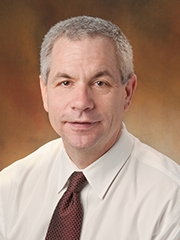 John M. Maris, MD Twelve researchers in the Cancer Center at Children's Hospital of Philadelphia (CHOP) have won the 2021 Team Science Award from the American Association for Cancer Research (AACR). The award, presented annually at the AACR Annual Meeting for collaborative scientific advancements, recognizes the significant contributions to the pediatric cancer research community made by the St. Baldrick's Foundation-Stand Up 2 Cancer Pediatric Dream Team. The Team is led by CHOP physician-scientist John M. Maris, MD and co-leader Stanford University immunologist and pediatric oncologist Crystal L. Mackall, MD, and supported by a multi-disciplinary group of researchers across 10 North American centers.
John M. Maris, MD Twelve researchers in the Cancer Center at Children's Hospital of Philadelphia (CHOP) have won the 2021 Team Science Award from the American Association for Cancer Research (AACR). The award, presented annually at the AACR Annual Meeting for collaborative scientific advancements, recognizes the significant contributions to the pediatric cancer research community made by the St. Baldrick's Foundation-Stand Up 2 Cancer Pediatric Dream Team. The Team is led by CHOP physician-scientist John M. Maris, MD and co-leader Stanford University immunologist and pediatric oncologist Crystal L. Mackall, MD, and supported by a multi-disciplinary group of researchers across 10 North American centers.
"We are honored to receive this award, which recognizes the hard work done by this collaborative, forward-thinking group," said Maris, who is the Giulio D'Angio Chair in Neuroblastoma Research at CHOP and Professor of Pediatrics at the University of Pennsylvania Perelman School of Medicine. "When we formed this Dream Team eight years ago, our idea was to bring cancer genetics researchers together with immunology researchers to solve some of the most difficult problems in pediatric cancer. Our group has made great strides, discovering how childhood cancer evade the immune system and introducing new and effective treatments to meet our goal of improving lives of children with cancer."
St. Baldrick's Foundation-Stand Up 2 Cancer Pediatric Dream Team focuses on developing new, targeted therapies that harness the body's own immune system to fight the most aggressive and lethal childhood cancers. The researchers focus on three areas to advance this research: basic science, clinical studies, and translational research that takes scientific discovers from bench to bedside and back again. In addition to identifying new targets in these cancers, the team focuses on building new anti-cancer antibodies, antibody-drug combinations, and CAR T cells to engage with these targets and specifically destroy the cancer cells.
Building on their discoveries, the team has launched a clinical trials network that has opened 42 clinical trials and treated more than 1,100 children, many of whom have shown long-term, complete responses, effectively curing patients whose disease was previously considered incurable. The group's research has led the development of CD19-directed CAR T cell therapies for refractory childhood leukemia, as well as efforts to target CD22 with CAR T cells. The researchers also launched the first bispecific cellular therapy clinical trial and have opened several clinical trials for pediatric solid tumors. Team members also launched the NCI-funded Pediatric Clinical Trials Immunotherapy Network, which will streamline future trials.
"I'm very proud of the accomplishments of our team," said Mackall, who is the Ernest and Amelia Gallo Family Professor of Pediatrics and Medicine and the Founding Director of the Stanford Center for Cancer Cell Therapy, at Stanford School of Medicine. "It goes to show that, as researchers, if you work together you can get more done. We are also grateful for the philanthropic and foundational support that made this research possible. The combination of substantial funding at the right time with enough flexibility to do what needed to be done was critical to our success."
In addition to Maris, the CHOP team includes Jennifer Baldi; Kristopher Bosse, MD; Sharon J. Diskin, PhD; Jessica B. Foster, MD; Stephan A. Grupp, MD, PhD; Shannon L. Maude, MD, PhD; Yael P. Mossé, MD; Sarah K. Tasian, MD; Andrei Thomas-Tikhonenko, PhD; Amber Weiner; and Mark Yarmarkovich.






